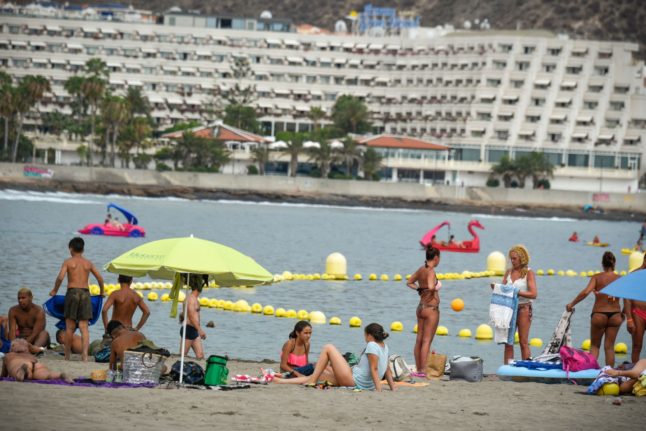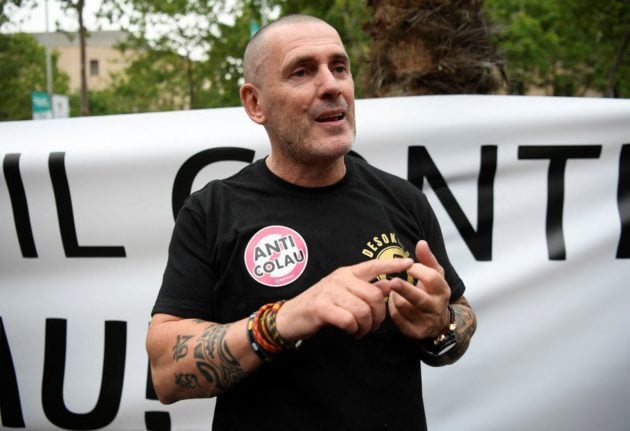On Saturday April 20th, thousands of people across the eight islands that make up the Canary archipelago will take to the streets to protest a tourism model which many Canarios believe is now failing them and their beloved land.
In fact, there will also be demonstrations in Madrid, Barcelona, Málaga, Granada and even Berlin, Amsterdam and London, under the same slogan: Canarias tiene un límite (The Canary Islands have a limit).
It’s already made international headlines due to the alleged wave of ‘tourismphobia’ that’s sweeping across Spain’s holiday hotspots in recent weeks and months (mainly ‘tourists go home’ messages in the form of graffiti or stickers).
48 horas para la manifestación más grande de la historia de Canarias.
🤍🩵💛
Defiende tu hogar! #CanariasTieneUnLimite #20deAbril #defiendetucasa pic.twitter.com/HalZCHPs7L— ⴰⴷⴰⵔⴳⵓⵎⴰ ⵣ (@DavidSuarezLez1) April 18, 2024
But the protest organisers have been quick to stress that they are not against tourists per se, but rather the voracious mass tourism monster which is eating up their islands, demanding more hotels to cater for more tourists despite the limited land available.
So why now, when Tenerife, Gran Canaria, Lanzarote and Fuerteventura have offered the ‘sun, sea and sangría’ package holiday deal for decades?
Because as the slogan states, the Canaries have a limit.
The islands are running out of space as around 40 percent of their territory is protected and their population keeps increasing (2.2 million in 2024), mainly due to the arrival of foreigners, meaning that the population density in Tenerife and Gran Canaria is off the charts.
Add 14 million yearly tourists to the mix and it really starts to put pressure on resources: water, electricity, sewage, roads, parking spaces and crucially housing.
Little space, few plans for social housing and holiday lets spreading like wildfire have led property prices and rents in the Canaries to increase more than in any other region in Spain in 2023, even though their wages are the second lowest in the country.
To cap it off, the record tourism numbers and revenue Canary authorities brag about do not reflect on people’s earnings or quality of life, quite the opposite, and there’s a sense that locals have become second-class citizens in their own land while tourists are given priority.
The challenge after Saturday’s protests will be to clearly define how exactly there can be a change of tourism model when the industry accounts for 35 percent of the islands’ GDP and 40 percent of jobs.
Similar introspection may happen in the Basque Country this Sunday when up to 1.8 million people head to the polls to vote in their regional elections.
The Catalan independence bid has stolen the limelight from Basque separatism in recent years, not least because many Basque nationalists were forced to reconcile with the fact that ETA was a terrorist group which killed 850 people over 42 years in the name of their cause.
Según encuestas Bildu ganaría las elecciones vascas.
Es increíble que tanta gente se haya olvidado de ETA, tantos jóvenes no tengan puta idea de que fué, y tantos voten a favor de que les quiten ayudas como el RGI.
Esto se va a convertir en euskadistan y muchos nos iremos pic.twitter.com/Jssv2Ft2N0— 𝕯𝖆𝖘𝖙𝖆𝖓 (@dastansullivanx) April 14, 2024
Even though this has meant that separatist voices have fallen silent for the last two decades, EH Bildu, a party descended from ETA, leads in the polls, having garnered the attention of young Basques in particular.
READ MORE: Why separatist Bildu spells hope for Basque youth as Spanish region votes
There’s a sense among commentators that this ‘amnesia’ exists not only because they didn’t live through the bloody years of car bombs and explosive packages, but that the history of ETA and its impact on Basque society isn’t being taught in local schools.
What has struck a chord among young voters appears to be more closely related to EH Bildu’s left-wing policies rather than their refusal to call ETA a terrorist group. For the Basque Socialist Party, “they pretend to be left-wing but what they really want is independence”.
Whatever happens on Sunday, it’s unlikely to reflect a sudden change in stance regarding Basque independence. A recent survey found that support for Basque separatism has fallen by 30 percent over the last decade among voters of the region’s two most nationalist parties, the PNV and EH Bildu.
It seems that being a nationalist in the Basque Country no longer equates to being a separatist.



 Please whitelist us to continue reading.
Please whitelist us to continue reading.
Member comments